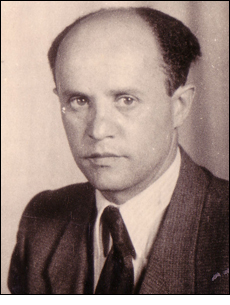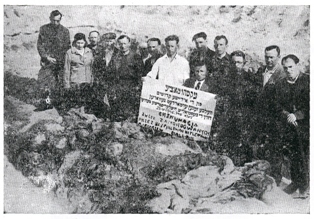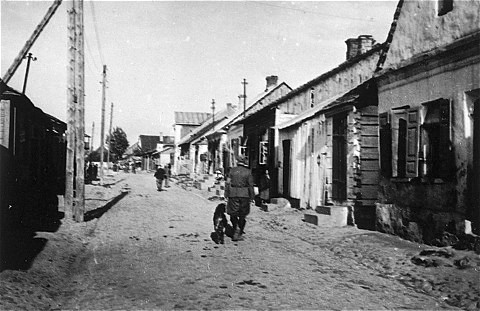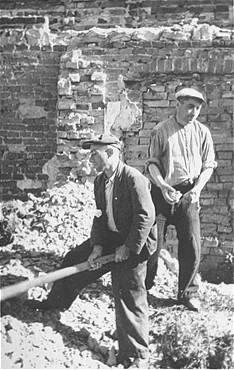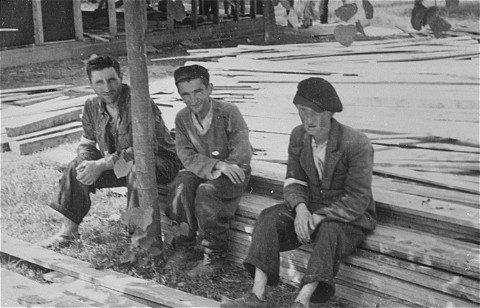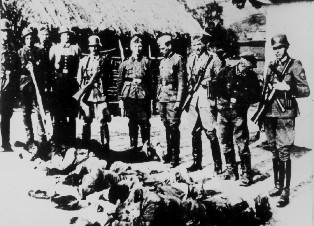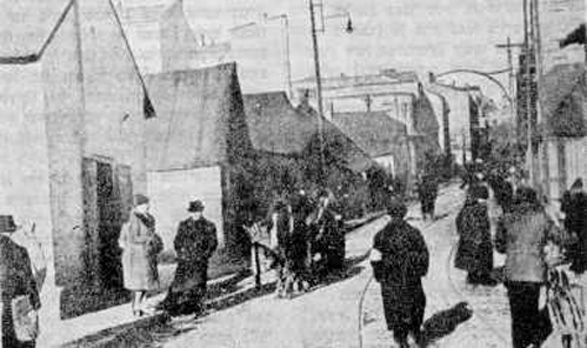Holocaust Education & Archive Research Team |
|
Survivor Stories
Holocaust Survivors Chelmno Survivors Righteous Gentiles Holocaust Recalled
| ||||||||||
Selected Extracts from the Memoirs of Samuel Jarniewski A Jewish Prisoner of War Part 1
Samuel Jarniewski a Jew served in the Polish Army, and on the 11 September 1939, he was captured near Lomsha, eastern Poland. In late October 1940 Samuel and his fellow prisoners were sent to a Jewish camp at Biala- Podlaska and this is where we join this account. Jewish Camp Biala- Podlaska We arrived at Biala – Podlaska at the end of October 1940 late in the evening. With great fear we waited for the reception and what would come. When we saw the SS men dressed in black watching us after taking over the transport, we were very sad. After a half an hour march we arrived at the camp. When we saw the sign at the camp, “Jewish Camp in Biala- Podlaska,” we realised the big lie that we had been told at Stalag 1A. We were put behind a fence again, but this time on the other side were SS men and their paid Ukrainian murderers. When we entered the living blocks that had been chosen for us, we met there the old inhabitants of the camp who were civilian Jews from Poland. We found these people in an indescribable state; barefoot, badly clothed and starving. Immediately I saw the picture of what was waiting for us in the future. Millions of flies prevented us from resting after the long journey. We also got to know the cruel reality of what had happened here in the gouvernment and with the Jewish people during the one year of my absence. I also learned that we were to replace the old people of the camp who had no strength anymore for the hard work of constructing an airfield in Biala- Podlaska. In the early morning of the following day we were ordered to work. When the building managers of the airfield saw us, they were very happy to receive new workers.
Most of the building managers were soldiers of the Air Force and cannot say that they treated us badly. After their intervention, the living blocks were disinfected, and after one case of very bad treatment on the march from work, we were fetched and brought back in from the camp under the guard of the Air Force. Many of our comrades escaped to the River Bug in order to reach their homes but several of my comrades and I received warnings in letters from our families not to come home in this illegal way. There was also the possibility of leaving the camp in order to become a member of the Jewish civilian government (Judenrat), but I advised my fiends not to and made the decision never to leave the camp. It was better to be a prisoner of war in the camp than to bear the fate of the civilian Jewish people. And so I went daily to my work on the airfield and did my best not to go hungry. I waited patiently for what was to come. Every day we grew fewer and fewer in numbers, partly by leaving and partly by escape. I received letters from home and from countrymen that were in the Judenrat. One day at the end of December some of us became ill from typhus and by order of the military doctor, the camp was sealed off. The illness became an epidemic and soon many of us were ill and went into the sick room. Conditions in the sick room were unbearable and we were two, sometimes three to a bed. The nursing was good but we had nothing with which to recover, no tea, or other beverages that were necessary for this dangerous illness. Before my illness I received some money from my friends and with this money I bought some bottles of red wine that were the only refreshments I had during my illness. I also separated myself from my comrades who had been lying in the bed with me. Although the cases of death were small in comparison to those from the treatment and conditions after the illness, the sickness was a hard one. It was months until I was healthy again. Five hundred people got sick in the course of the winter. In February of 1941, when we were closed off in the camp because of the epidemic, we saw large military movements on the road to the River Bug. Day by day, transports were driven to the river. We had a lot of time to observe this accurately. The Jewish civilian workers had to work with a feverish speed in order to repair the road that led to Moscow – Warsaw. Several of us already saw the beginnings of a war against the Soviets and with frightened hearts we feared for the fate of our families who had been safe until then. Our weak state of health however, did not allow us to think so much. Our futures were already grey and we had to concentrate on regaining our health.
Slowly we recovered everyone to his opportunities; some from home packages and some from the camp kitchen. Some of us thought that the winter would soon be over and as surviving typhus in wartime is good we consoled ourselves in this terrible time. In March 1941, around the twelfth, or thirteenth, S.D. men were placed around the camp and everyone was given the order to enter except for the people from the sick room. Some of us were quite weak and not completely healthy but there was nothing to do, an order is an order. We al took our packages and other possessions and were counted off; we were more than three hundred. We were marched to the station under very strong guard, loaded into trains and travelled in a direction that was unknown to us. Our chief worry was not to be sent to the big prisoner camp in Lublin where we heard that our comrades were being treated even worse than in Biala- Podlaska. We had no possibility to change our course though; only an escape would change it and most of us were too weak to escape. We rode the whole night until we passed Pulawy on the river Weichsel (Vistula) and stopped in the early morning. The trains were opened and each car was counted separately. After an exact count, it was discovered that three men had escaped from the train. We were all ordered back into the train cars, except for the car from which the three men had escaped. They remained outside and their collective punishment began. All the people who were in the wagon were tortured severely; we were ordered to sing loudly as possible, so as not to hear their cries. After torturing the prisoners for an hour, we were unloaded from the cars and marched under beatings in running steps to a little place called Konska–Wola, six kilometres from Pulawy. I marched in the last row and when the guard saw that I wasn’t completely healthy he felt pity for me and gave me some brandy and let me march at a slower pace. Labour Camp Konska-Wola
When we arrived at the camp, we could observe our comrades that had been tortured for the first time and the sight was a very sad one. Fourteen people were brought at once to the sick room where they got first aid. One of them had an eye cut out and all of the others had their wounds dressed. Two of the prisoners died from their blows after lying in the sick room for several days. In Konska- Wola camp, we were taken over by the Jewish camp leader whose name was Rosenberg. Originally from Frankfurt, Rosenberg was a very clever man. At his service were Jewish persons from the Warsaw ghetto who helped him in his work. We tried to persuade the camp leader that some of our comrades whom we had selected should also be part of the camp leadership. Those prisoners who were not quite healthy did not need to perform hard labour and the remaining ones liked to work as the work was partially paid. We worked with the South German road-building firm Lenz who treated us reasonably well. We were quite content with our present state as the conditions and board were much better than before. As Polish prisoners of war we were also treated well by the Polish people and were able to make contact with our homes. After receiving four nights off work to recover from my illness, I began to work at the road building and was content as after a year and a half, I could finally move without military or SS guards. We were rarely able to sleep at camp, but were used to this and anyways, we were prisoners without guards and this was enough for any of us. We also made the acquaintance of the Jewish inhabitants of the area and saw the great torments that these people had to suffer under the German occupation forces. They had to live in poverty and most of the village was starving. They envied us because we were prisoners and received some relief from home. More than once I gave as a present something from my food packages to the starving children as did many of my comrades. More than one mother thanked us with tears in her eyes. In this way the months of March and April passed. The building managers of the firm ordered us to work faster as the roads had to be ready by the middle of May. The military movements grew every day and we were all sure that a cruel war was coming. Some of the military units had come from occupied Yugoslavia, which we could tell by the names written on the sides of the freight cars. In a very rapid deployment, they came from there to the East, asking us if they were already in Russia, or how far it was to the Russian border. So it was with great fear that we waited for what was to come in the future.
In May we finished the construction of the roads and were taken over by the Weiss and Bock construction firm who built fortifications for the German army. In comparison to the Lenz firm where we were treated as workers, we were treated very poorly. The Oberschachtmeister Josef and his men were murderers of the first class. They had no pity whatsoever for the men and beat their victims until they would fall down. The tempo of the work was so fast so that we would be totally exhausted after one day’s work and could hardly begin the next working day. After leaving Weiss und Bock we were separated into a large group for work in the area, we were sent to the agricultural farm Posog that was a government farm and an agricultural research institute. The work was not very hard, but we received very little in wages, which made it hard to survive, as we were not receiving the meagre board that had been provided at camp. We were forced to make use of the old means of organisation, and so I began to look for every opportunity to obtain something for my livelihood. In the beginning I worked at the agricultural farm and afterwards obtained work writing and painting. In this way I could also do private work and earn enough for some food. I also obtained some painting work for the country government, which paid very well. I also received some extra board from my employer so that I would not starve. I later made some new boots and in this way the entire summer passed. In October I received the first letter from my father and from my dear wife. I was overjoyed, but found it strange that my youngest brother Wolf who had always written me, did not write anymore. I wrote incessantly and asked my family to tell me the truth of what had happened. Finally my sister wrote me a letter letting me know of the entire truth. Our small town had been bombed in the first days of the war and our house had been burnt down. My brother Wolf, who had been the dearest to us all in the family, was killed during the bombing. Because of the on-going military operation, my elderly father had been forced to bury him alone. I immediately went into a deep mourning and could never console myself over the loss of my brother. I wrote letters to my wife, my sister and my father telling them not to save anything, but to sell anything of value including my clothing in order not to starve. They received my letters regularly and acted on my advice. Autumn came and sleeping conditions in the camp became worse. Some comrades and I organised a room in a private house near the camp; in the beginning the camp leader did not allow this but in the end we got our way and slept outside of the camp. This gave me the opportunity to get some rest after work and to keep clean. Winter came and conditions for the Jewish civilians grew increasingly worse. The hunger, cold, torture and general mistreatment of these poor people by the SS groups that were stationed there was great. Every night, sad acts such as robberies, violence, and other crimes occurred, bringing death to the inhabitants in many cases.
In the labour office of the nearby town of Pulawy, there was a work inspector by the name of Wagner who distinguished himself through sadistic acts against the Jewish people. One day at the end of January 1942, Wagner gave the order to bring over all the prisoners to Demlin to work on the fortifications of a street, which was situated on the shores of the River Weichsel. In the beginning many people wanted to avoid this work because we would be placed in barracks in the forest where it would be impossible to organise anything to supplement our food. We were forced to do this work on the pain of death in freezing weather. I managed to supplement my food with the money that I had saved from my private work. We would work for six to seven hours and return to our barracks where we could rest in relative warmth. At the beginning of April, a horrible massacre occurred of hundreds of civilian Jews in the small village of Wonwelnize near Lublin. A Polish Volksdeutscher had been killed by the partisans who had become more active in recent weeks. As a punishment, 600 of the Jewish inhabitants of Wolwelnize were shot in cold blood. Word of the resettlement actions in the Lublin ghetto had also reached us in which thousands of women and children were shot on the spot for no reason. The ones who came to the transports were loaded into cattle cars, more than one hundred people to a cattle car. These cars were put on a by-track and stood there for three or four days without food or the possibility of the simplest hygiene. We were very saddened by these accounts but were helpless, tired and without courage to do anything. At the end of April we finished our work and were ordered to come back to the camp at Konska-Wola. We took all of our things and went back to the camp. When we reached the camp, the order was changed and we went back to the barracks in the forest. There, we discovered that the Jewish residents of the nearby town of Kurow had been resettled and were staying in our camp until their transportation. In the small camp building which served as a cinema for the inhabitants of Konska- Wola, the Jews of Kurow who numbered almost two thousand people were herded in together, men, women and children. Due to the crowding, there were several deaths before the transports began. Once the people had been transported, we returned to the camp. When we entered the camp we found many dead bodies and it was several days until we could bring it into order again. We were then informed that we would be employed again by the construction firm Weiss und Bock, and that all of us without exception were to report to work. We received this message with great apprehension, as the firm with its cruel Meister was well known to us. The job was heavy construction work of a bigger building at the agricultural research institute at Pulawy. Along with us worked a group of civilian Jews from Konska-Wola who were as badly treated and paid as we were.
That was much better for me because I could do special work in the offices of the firm and had sufficient food to eat. In addition to this I was paid reasonably well and had the opportunity to organise. I could now save some money and help my cousin Max who had been taken to the prisoner of war camp in Lublin and some of my comrades in the camp who were in need of help. In the middle of May, the Jews of Konska- Wola were resettled and we were all taken back to our camp. When we went to work, we encountered the residents of Konska- Wola marching to the railway station. I could scarcely believe the horrible picture that faced me: the march to the death of so many women, children, and elderly people, herded together by the SD men and their helpers. These gentlemen of the “superior race” treated the helpless and unprotected people like ox-shepherds. Today six years later, this image remains before my eyes. Here he found a child of three years of age who had hidden in a hole. With three shots from his Browning he ended the life of this little child. We could hardly believe that such a proud man could kill a little child. After that he began to order us around in our language and selected five of our comrades, signed them off as unable to work and sent them to the station for transport. We recognised the reality of the situation and that our cruel fate was unavoidable, but had no time to think about it and went on with our harsh work day by day. We tried to find out in which direction the transports were going but to no avail. The German killing commandos had different ways of telling us that we ought not to know what was happening. Some told us that the resettlement was far in the East and others told us that it was somewhere in the opposite direction in an effort to calm us. After a few weeks, I discovered through some Polish railway workers that all of the transports from Konska-Wola and the surrounding area had gone to Sobibor, which was said to be an extermination camp. In the beginning I didn’t want to believe it, but after some months I could see that this was the real aim of the transports. During the holiday of Whitsuntide, two weeks after the Jews of Konska-Wola had been resettled; we marched in the early morning hours to work. On the way we saw a transport of more than 3,000 Jewish men, women and children from Slovakia pull up at the railway station at Pulawy. They were unloaded and brought to Konska-Wola and took quarters in the dwellings of the resettled Jews. The optimistic people were calmed by this, many of them thinking that the previous Jews who had been resettled in the same way. There were also individuals among them who already understood the German’s tricks very well. The dwellings were given to the Slovakian Jews in order to prevent resistance to resettlement and what happened further on was proof of this.
The Slovakian Jews who settled in Konska – Wola were distributed at once among the different working details, some of them in our construction brigade. In the time immediately after their arrival they were all healthy and were not starving. After a few weeks it was hard to recognise them. The hunger and the brutal treatment at the work details worked against the people and broke them down resulting in thirty to forty deaths each week. Three quarters of the Slovakians were swollen from starvation, the hardest hit being the children. I considered this at once and brought a mess kit with food from my work detail each day and gave it to the first person that I met coming back from work. I did all that was in my power at this time in order to prevent the people from starving. The Hochtief and Schwanke Construction Firms The Hochtief und Schwanke construction firms worked in the area surrounding Pulawy. Employing Jewish labour, they built the Radom – Lublin railway track and even had their own camp in which the workers lived. The workers were guarded by the SS and suffered mistreatment. Every day several workers were beaten to death by the guards and the “Meister.” The conditions in the Hochtief camp, which was in a village near Pulawy, were horrible and the hunger was immense. Till this day, I am unable to describe the horrific sufferings of the people who were interned there. Even worse was the treatment of prisoners by the Schwanke firm. Seven hundred inhabitants of the Warsaw ghetto were employed with this firm and were interned in a camp in the village of Clemetovitze near Lublin. The civilians came from the ghetto starving and ill without the strength to work. As a result of this and of the cruel treatment by the construction “Meisters” and guards, ten or more people would fall down dead every day. One day, Wagner and the construction manager resolved to kill the rest of the workers, about six hundred people. A big hole was dug and all of the remaining workers were thrown in and shot. When this happened in the middle of July 1942, we all came to believe what had really happened at Sobibor and Maidanek.
Today, I see the headquarters of the Hochtief firm in Munich, portraying themselves as an innocent construction firm, but I see in this firm like all over construction firms as destroyers of humanity and European culture. I wrote to her and told her to take the child and move in with a scientist’s family that I was well acquainted with. In the beginning, she did not understand the importance of what I was saying, but after her family advised her the same, she heeded my words. She moved in with the scientist’s family who received her very well and wanted to do everything in order to save her life. My wife and fate decided otherwise however, and after two weeks she returned home to her father and brother and said that whatever would happen to her family would also happen to her. And so I lost the most faithful and dearest part of my life. I heard the first accounts of what happened when I was liberated in May of 1945 through the few people who remained alive from my home. My wife, child and all of my family were taken away in cars and perished in the gas chambers. It was a pity that I could not help them, neither with advice nor with actions. The last letter that I received from my family was in October, shortly before the last resettlement from Konska-Wola. As each day passed conditions inside and outside of the camp became more and more unbearable. Each day brought new orders and inventive cruelties. We worked all day and after six o’clock at night, anyone caught outside of his barracks would be shot at once. The Jewish civilians were forbidden to travel by any means; by motorcar, train or even horse carriage. Also prohibited were any type of animals; no poultry, cows, goats or any other domestic animals. Also forbidden to everybody was the planting of gardens. Jewish houses were forbidden to use stoves; every cooking or baking stove had to be destroyed on the pain of death. And so a variety of laws were passed to persecute the Jews. At the end of August when we returned from work, we discovered that something extraordinary had happened in town. With great fear, we approached the camp from the rear and found out the sad truth. The S.D. men from Pulawy along with the work inspector Wagner and some high officials of a nearby country town had entered Konska-Wola and had shot the first ten Jews that they encountered with the declaration, “Because you are Jews!” The shooting was done in public in the centre of town and made a chilling impression on us. From our comrades at the prisoner of war camp in Lublin we received news of the same scenes being repeated time and time again. And so time passed until we reached the autumn holidays. With great fear we dreaded the coming autumn and winter. At the beginning of October, the resettlement of the Slovakian Jews began to be spoken of once again.
Although the construction manager of the Weiss und Bock firm assured us that in the case of resettlement, we would remain as prisoners of the firm, the truth was in fact quite the contrary. When we woke up on October 15, we discovered that the resettlement commando had come and blocked off the entire town. We were not allowed to go to work or even leave the camp buildings. Incessant shooting began in the town, and the entire sickroom was shot including my comrade Grascziewski from home. The shootings continued throughout the afternoon in all of the houses, killing more than three hundred victims until the end of the resettlement action at two o’clock. We waited together in the camp awaiting our fate. Around three o’clock, the commando entered the camp and ordered us to leave with all our things. Everyone took his bags, and the Oberscharfuhrer Hanke, a known murderer in the district of Lublin, received us and took out a hundred and fifty healthy prisoners and declared that our group of prisoners of war would come under his protection. Hanke would lead our camp that was to work at the Heinkel airplane works. We were loaded into freight cars and after an hour’s ride arrived once again to a camp under barbed wire and under the guard of the SS. Here, in the work camp of Budzyn, a new chapter of suffering began.
Source:
Holocaust Historical Society USHMM Yad Vashem
Copyright. Victor Smart H.E.A.R.T 2011
|
%20in%20the%20Polish%20army.jpg)
